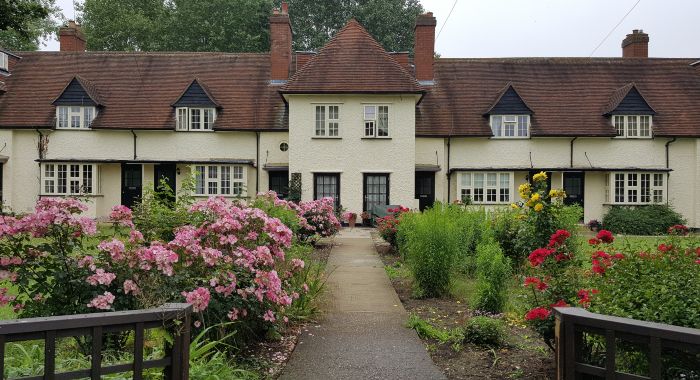When it comes to buying a new home, you’ll be needing to know how much you can borrow from a lender and the mortgage in principle is the figure that you will be given for this purpose.
However, when asking about what is a mortgage in principle, you also need to appreciate that some lenders may refer to it as:
- An agreement in principle;
- A decision in principle;
- Or a mortgage promise.
Essentially, your mortgage in principle from your lender will make clear how much you can borrow.
It is not a guarantee that you will get a mortgage for this amount!
This certificate also proves – at least when it was issued – that you are creditworthy and that a mortgage lender is willing to lend the amount you are looking to borrow.
It also needs to be understood that when you begin house hunting that you do not have to have a mortgage in principle certificate but you may find that it will be of big help when you put a bid in.
The key word to appreciate here is ‘principle’ and this certificate enables you to look for a new home within a certain price band and with some reassurance that this is how much you can potentially borrow.
For homebuyers in Scotland, you will need a decision in principle before you can make a bid on a property since the house buying process there is different to that in England.
What is the difference between a mortgage in principle and a mortgage offer?

As explained previously, there’s a big difference between a mortgage in principle and a mortgage offer.
The potential lender will take basic information so they can perform a credit search and offer you a mortgage in principle figure that they are willing to lend to you.
Usually, these agreements in principle will be free and take just a few minutes to organise.
One of the big attractions for having a decision in principle is that:
- You can prove to a home seller that you’re in a position to afford their property;
- This may be the edge necessary when the seller is deciding between various buyers;
- Though having a mortgage in principle is not proof you have the money available until you complete the formal application for one.
It’s from this point that the mortgage lender has the right to change the details of any deal that they offer, or whether they even offer you a loan. For example, your personal financial circumstances may have changed since the mortgage in principle was agreed.
It’s also a good idea to look at what is a mortgage offer? The mortgage offer is a formal document that will be issued by the lender to you as a borrower. It’s this offer that confirms that the lender has completed their checking process and is happy to advance the mortgage loan.
The mortgage offer is also a binding contract between the lender and yourself.
However, the offer is only offered once your creditworthiness has been established and you have proved that you have the appropriate income and with a financial conduct history that the lender approves of.
As a potential homebuyer, you also need to appreciate that the mortgage offer can be withdrawn by the lender at any point, though this is very rare, and you will be left with the costs racked up by solicitors when you fail to complete.
Does a mortgage in principle affect your credit score?

Firstly, having a mortgage in principle will not affect your credit score – if you apply for just one agreement.
The lender will carry out a ‘soft search’ or enquiry with a credit agency but you must avoid accumulating lots of ‘hard searches’ which may affect your credit status and credit report, particularly if they have been done over a short period of time.
This is an important point and you should not be shy about asking a lender whether they are carrying out a ‘hard’ or ‘soft’ search at this point – always avoid having a hard search as this may affect your credit standing for when you apply.
It also needs to be appreciated that your ability to take out credit, for instance, a car loan or lease, will also be affected if there are a large number of searches on your credit status.
A lender will want to know:
- The name and address (so they can check you live there);
- Your date of birth;
- Your salary income – or joint incomes;
- How much you spend currently;
- And whether you have any other credit agreements.
The last issue will be to focus on your affordability and whether you have too much credit to manage effectively.
You don’t need any supporting documentation at this point, such as bank statements or payslips, but you will do when making an application for a mortgage.
Can you put an offer on a house without a mortgage in principle?
Yes, you can put an offer in on the house without having a mortgage in principle.
The reason for this is that the agreement in principle from a lender is not proof that you will be able to access funds for the same amount.

Also, the agreement in principle is not a legally binding contract, so the lender retains the right to offer you as a borrower a different amount or even a different mortgage product and interest rate altogether once you have completed the formal application process.
In some circumstances, the lender might even withdraw their offer.
Essentially, the agreement in principle is a big step towards you securing a mortgage in buying a home.
There will be lots of people bidding on houses without such an agreement in place. This should not stop you from bidding though you need to be aware as to whether or not you are creditworthy to access a mortgage to complete the purchase – if your bid is successful.
There’s also an important caveat for anybody who wants to put an offer in on a house without having a mortgage in principle agreement.
And that’s the fact that many home sellers and estate agents are unlikely to take the house off the market once a bid has been made if you do not have an agreement in principle with a lender.
The reason for this is that they have no idea as to whether a lender will even consider you as an applicant for the amount of money you want to borrow.
However, once you make a bid and have it accepted you will begin the process to appoint conveyancing solicitors and complete the application.
Why would a mortgage in principle be declined?
One of the issues that comes with home buying is that you may have a mortgage in principle declined by the lender.

There will be a range of reasons as to why your application for an agreement will be declined and the lender is under no obligation to give a reason as to why they have done so. It may simply be that you cannot afford a mortgage with your current income level.
However, there are some common reasons as to why a mortgage in principle may be declined and they will be related to what the lender finds on your credit report or application, including:
- You don’t earn enough;
- Your outgoings are too high;
- You have recently taken out another form of credit;
- Changing jobs;
- Missing payments and building up arrears;
- Not meeting the lender’s specific criteria;
- Discrepancies in your application.
There’s also an issue if the lender seeks information from more than one credit reference agency and finds a discrepancy in the information being held between them.
Does an agreement in principle mean I will get a mortgage?
While having an agreement in principle is of huge help when house hunting, it does not mean that you will get a mortgage.
That’s because you have not completed the full application process which is more in-depth than the application for a mortgage in principle.
The lender will carry out a more thorough understanding of your financial circumstances and whether you are able to repay the agreed amount.
So, while you may easily access a mortgage in principle agreement, it is not a given that you will access a mortgage to complete a purchase.
How reliable is a mortgage in principle?

The issue of how reliable is a mortgage in principle may be important for those who want to move quickly and bid on a home.
Put simply, it’s is not a reliable indicator that you will be able to access a mortgage. If you have an agreement from a lender but then have your application declined does not mean another lender will not approve your application.
While this will be an inconvenience, you will have to find a lender willing to offer you a mortgage but this might have a higher loan-to-value (LTV) which means that you will need a larger deposit and be charged a higher rate of interest.
In turn, this means that you will have larger repayments to make which then might make the mortgage unaffordable and you won’t be able to buy the home that you are hoping for.
What happens after a mortgage in principle?
Once a mortgage in principle has been agreed and you’ve received the certificate, not a lot happens after that because you will begin the search for your new home knowing how much you may be able to afford.
Be aware that there’s a limited time for the certificate to run for, but you can bid on a property you like before applying for a mortgage.
How long does a mortgage in principle last?
For those interested in how long a mortgage in principle lasts for, then it’s important to appreciate that the lender will state that their offer will be available for between 60 and 90 days.

When the agreement ends, you will need to reapply but you need to be careful as to how many mortgage in principle agreements you apply for since a credit search will be carried out for each one.
And having too many credit searches for your name and address may damage your credit score and, unfortunately, the potential for you to access a mortgage to buy a property should a lender view lots of credit searches over a short period of time in a poor light.
Mortgage in principle then declined?
The big attraction for having a mortgage in principle agreement is that it indicates how much a lender will offer you as a customer.
It’s this agreement in principle that is still an important part of accessing a mortgage but they are not proof that you will actually qualify for one once the lender’s application process has been completed. The agreement will:
- Give you a ballpark figure as to how much you can borrow;
- This amount will then dictate the price range of homes you are able to buy or afford.
However, for those who apply for an agreement in principle and have this application declined, it’s not the end of the world when it comes to buying a home, particularly for first time buyers.
This simply gives you more time to improve your credit status to boost your credit report to a potential lender. This will then improve your chances of being accepted for an agreement in principle when you reapply.
It might even be worth considering applying for a free online agreement in principle that some lenders offer so your overall affordability and creditworthiness will become apparent.
This process takes just a few minutes and you lose nothing by checking beforehand.
It’s worth appreciating that being declined for a mortgage or the agreement in principle will not have a negative impact on your credit status. Basically, another lender will not see the outcome of your credit application, though having too many credit searches carried out by lenders will affect your creditworthiness over a short period of time.
What is a mortgage in principle and why you should get one
There’s a lot to recommend potential homebuyers to seek a mortgage in principal agreement because this will show that:
- You are creditworthy;
- A lender has assessed your financial standing;
- You are in a position to be (potentially!) accepted;
- You know how much you can afford when it comes to buying a house.
The certificate will also prove to a potential seller that you are serious bidder for their home.
Essentially, the mortgage in principle is an important step for many of us when it comes to finding, bidding and then buying the home of our dreams.
And while you do not necessarily need one, there’s no doubt that having one may give you an edge when it comes to bidding on a home and the home seller being confident to accept you as a buyer.




